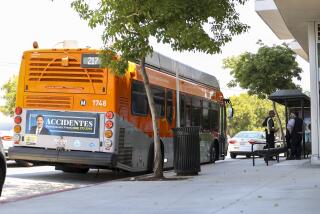Victorville-to-Vegas bullet-train plan imperiled by U.S. loan denial
Federal transportation officials have halted their consideration of a $5.5-billion government loan to a private company that has planned for years to build a high-speed train between Victorville and Las Vegas.
The decision represents a major setback for the XpressWest project, which has had difficulty obtaining financing from investors to construct the 185-mile line.
The proposed loan was many times the largest amount ever sought from the Railroad Rehabilitation and Improvement Financing Program, which is overseen by the Federal Railroad Administration.
XpressWest was notified June 28 by Ray LaHood, then U.S. secretary of Transportation, that its loan application would no longer be reviewed. LaHood left office this month.
The secretary’s letter, which became public this week, cited “serious issues” and “significant uncertainties” with the project, including potential problems complying with federal laws that require the use of U.S.-made products such as steel, rail cars and equipment.
The project is supported by wealthy casino operators and Senate Majority Leader Harry Reid (D-Nev.), who said he would meet next week with Obama administration officials in an attempt to persuade them to reconsider the loan application.
XpressWest, formerly known as DesertXpress Enterprises, issued a statement saying it would continue its plan to develop the “first true high-speed passenger rail system” in the United States.
Any federal money received for the project, XpressWest said, would be used to purchase construction materials made in the U.S. and to help create tens of thousands of American jobs to build and operate the system.
ALSO:
L.A. Unified unveils plan to bring arts into academics
San Diego Democratic Party won’t yet call for Filner’s resignation
At least 6 arrested at Zimmerman trial protest in San Bernardino
Twitter: @DanielJosephWei
More to Read
Sign up for Essential California
The most important California stories and recommendations in your inbox every morning.
You may occasionally receive promotional content from the Los Angeles Times.











